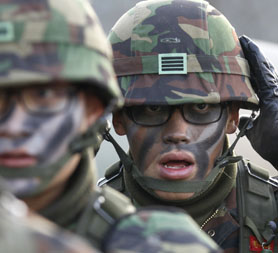South Korea: ‘Attack was crime against humanity’
South Korea’s President brands North Korea’s artillery attack on a west coast island a “crime against humanity,” and vows to retaliate against any further aggression from the North.

Lee Myung-bak was making his first address to the nation following last Tuesday’s attack on tiny Yeonpyeong Island in which four people were killed, two of whom were civilians.
In a show of force, US and South Korean war ships took part in military manoeuvres today, prompting China to call for the six nations involved in the stalled North Korean denuclearisation talks to meet urgently.
The six are North and South Korea, the US, China, Russia and Japan.
China’s Special Representative on the Korean peninsula, Wu Dawei, said the talks would not signify a resumption of the previous discussions but might “help create the conditions” for them to restart.
“North Korea will pay the price in the event of further provocations.” South Korea President Lee Myung-bak
This morning, however, South Korea appeared to dismiss the idea, with Seoul saying it would “carefully consider” the proposal, a comment widely interpreted as a rejection.
And the tone of President Lee’s speech this morning seemed effectively to confirm that South is not interested in talks.
He said: “North Korea will pay the price in the event of further provocations.
“Attacking civilians militarily is an inhumane crime that is strictly forbidden in a time of war. Now is the time to show action, not a hundred words.”
Unenthusiastic
Washington and Tokyo also appeared unenthusiastic about China’s proposals for talks, saying they would consult with Seoul.
Given the tough sanctions already placed on the North, holding talks could be seen as rewarding it for its aggression.
The attack raised tensions on the peninsula to their highest level in at least two decades, but experts say they are unlikely to tip over into a full-scale war.
The tense situation on the peninsula could be further aggravated by fresh revelations by the whistle-blowing Wikileaks website, which said there had been talks between US and South Korean officials about the prospects for a unified Korea.
According to the New York Times today, South Korea considered commercial inducements to China to “help salve” Chinese concerns about living with a reunified Korea, according to the American ambassador to Seoul.
-
Latest news
-
Taylor Swift’s new break-up album breaks records3m

-
NHS trust fined £200K for failings that led to death of two mental health patients3m

-
Sunak vows to end UK ‘sick note culture’ with benefit reform3m

-
‘Loose talk about using nuclear weapons is irresponsible and unacceptable’, says head of UN’s nuclear watchdog3m

-
‘There wasn’t an Israeli attack on Iran,’ says former adviser to Iran’s nuclear negotiations team7m

-




